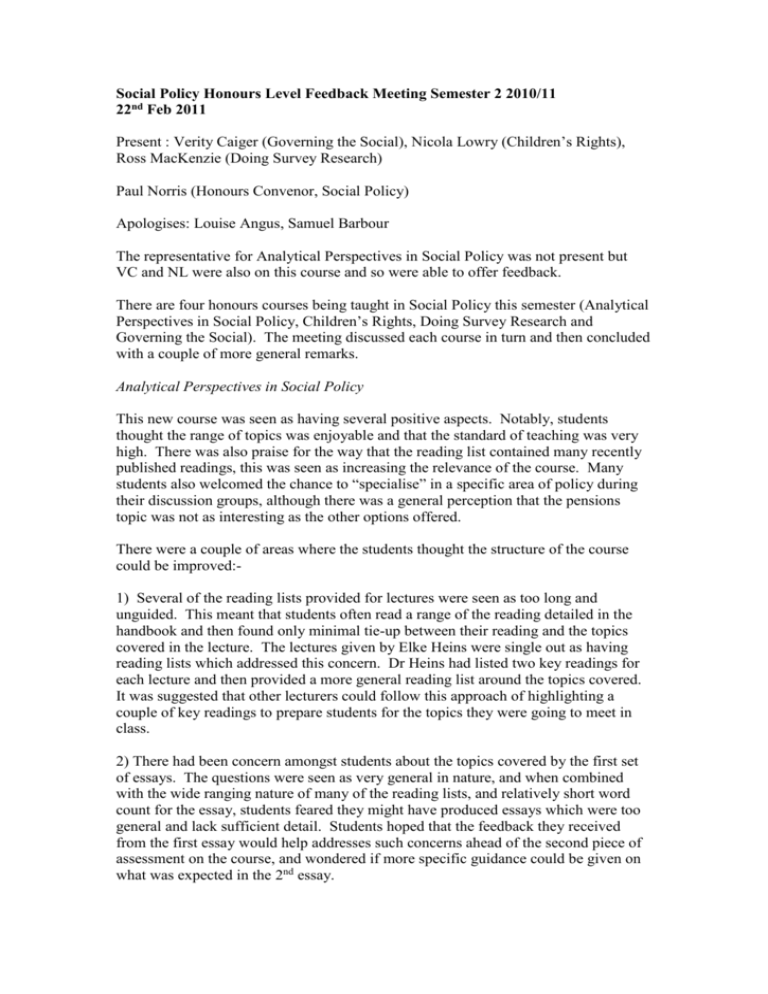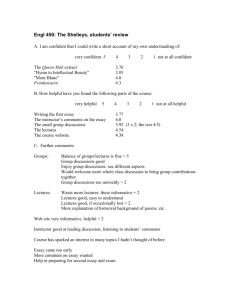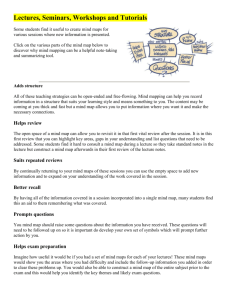Social Policy Hons Feb 11
advertisement

Social Policy Honours Level Feedback Meeting Semester 2 2010/11 22nd Feb 2011 Present : Verity Caiger (Governing the Social), Nicola Lowry (Children’s Rights), Ross MacKenzie (Doing Survey Research) Paul Norris (Honours Convenor, Social Policy) Apologises: Louise Angus, Samuel Barbour The representative for Analytical Perspectives in Social Policy was not present but VC and NL were also on this course and so were able to offer feedback. There are four honours courses being taught in Social Policy this semester (Analytical Perspectives in Social Policy, Children’s Rights, Doing Survey Research and Governing the Social). The meeting discussed each course in turn and then concluded with a couple of more general remarks. Analytical Perspectives in Social Policy This new course was seen as having several positive aspects. Notably, students thought the range of topics was enjoyable and that the standard of teaching was very high. There was also praise for the way that the reading list contained many recently published readings, this was seen as increasing the relevance of the course. Many students also welcomed the chance to “specialise” in a specific area of policy during their discussion groups, although there was a general perception that the pensions topic was not as interesting as the other options offered. There were a couple of areas where the students thought the structure of the course could be improved:1) Several of the reading lists provided for lectures were seen as too long and unguided. This meant that students often read a range of the reading detailed in the handbook and then found only minimal tie-up between their reading and the topics covered in the lecture. The lectures given by Elke Heins were single out as having reading lists which addressed this concern. Dr Heins had listed two key readings for each lecture and then provided a more general reading list around the topics covered. It was suggested that other lecturers could follow this approach of highlighting a couple of key readings to prepare students for the topics they were going to meet in class. 2) There had been concern amongst students about the topics covered by the first set of essays. The questions were seen as very general in nature, and when combined with the wide ranging nature of many of the reading lists, and relatively short word count for the essay, students feared they might have produced essays which were too general and lack sufficient detail. Students hoped that the feedback they received from the first essay would help addresses such concerns ahead of the second piece of assessment on the course, and wondered if more specific guidance could be given on what was expected in the 2nd essay. Doing Survey Research The quality of teaching provided on this course was seen as high. The quality of the “lab book” was particularly noted. Similarly, the “slow” pace of the early sessions was appreciated given apprehension about the mathematical content and compulsory nature of the course. Students commented on the usefulness of the early material on how to evaluate survey data and consider the data collection process. Related to this, the “professional” lecture from the person working for a company involved in running large-scale surveys was well received (especially given its relevance to the first piece of assessed work which was due at around the same time). Within the stats lecture, there was support for the inclusion of the small practical exercises which were used to illustrate points made. There was however a wish to see a tighter link between the lectures and the lab book - maybe highlighting which exercises in the lab book illustrated a particular point made in the lecture. There was a clear perception that those who considered the exercises in advance got most out of the lab sessions, and this was well received. Finally, the structure of the assessment which allowed students to receive feedback relatively early in the course was seen as positive for a course where the content and skills varied from most other honours options. One issue raised was, towards the end of the course, might it be possible to discuss the issues around taking the skills learned on this course (with specific datasets) and applying them to the research process associated with undertaking dissertations and other independent research. Children’s Rights Several students had signed-up for this course expecting it to be taught by Professor Tisdall and were disappointed she was not playing a more active role in the teaching. Overall, the course was seen as having interesting topics and was generally enjoyable. However, there were some specific points where students thought the delivery of the course could be improved:1) The areas of interest amongst Social Policy students appeared to be different from those students coming from an Education background. This led to an apparent lack of discuss of issues around Social Policy and Politics in favour of a more applied or “classroom focussed” series of discussions. These were often seen as of limited interest to Social Policy students. 2) With regards to lectures, it was felt that too much time was spent addressing practical issues (such as how to access WebCT). Would it be possible to leave these issues out of general class time, and then provide an opportunity for those students who had concerns like this to raise them after the lecture? As it was there was a feeling that these “how to be a student” issues were taking time away from substantive learning. 3) It was not always clear how lectures linked to subsequent discussions. It was suggested that the links could be more explicitly highlighted. 4) Students had been provided with examples of “position papers” to demonstrate what was expected in the first assessment. These examples generally involved their authors arguing for a specific viewpoint. However, students were told that their position papers should consider arguments from both sides. Students thought that this meant their position papers were rather like short essays and so were not sure what was expected, or of the merit of the examples they were given. 5) Reflecting point 4. Students were aware that their final course essay was not meant to be based on a topic which they had been extensively covered in class discussions. However, it was felt this left a relatively small range of topics which could be written about and as such would place high demand on a relatively small range of resources. Might it be possible to get guidance on exactly how different an essay question had to be from a topic previously covered in class? This might allow students a wider choice of topics and so reduce demand for particular resources. Could prevision be made for students doing more unusual topics to get input on possible readings? As things stood, students were likely to concentrate on a narrow range of topics top reflect the existing reading lists. Offering a chance for guidance on other topics might encourage students to consider a wider range on possible essay topics. Governing the Social This course was seen very positively with the class rep reporting they had not heard a single negative comment. The structure of the course, and approach of Dr Naumann were particularly praised with students feeling that they were learning analytical skills which would serve them well in the rest of their academic careers (notably through the weeks where students were asked to research a particular topic independently prior to class). Similarly, the range of assessments was generally positively received with the recent book review making a nice change from normal essay writing. Dr Naumann was particularly complemented on the way she led the course and engaged with students as equals during discussions. The focus on incorporating all the required readings into discussions meant that students could see a clear link between their independent learning and class teaching. It was suggested that on weeks where the class was going to predominantly take the form of a discussion, it might be appropriate to rearrange the chairs so that students could more easily interact with each other. General Points The reps asked that feedback from this meeting be made available to honours students in Social Policy so that they could better see the feedback process that as taking place. PN agreed to see how this could best be achieved When providing details of honours options which were available in any given year, it was suggested it might be good to include some feedback from students who had previously taken the course, rather than simple descriptions of the course content.








